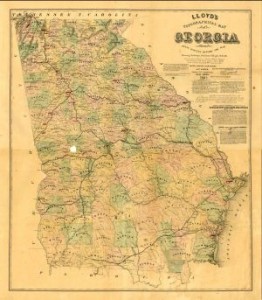 In the midst of a relative lull in the Atlanta Campaign, Union armies under General William T. Sherman seek to obtain a better position from which to launch a new offensive. Meanwhile, Major General A. J. Smith leaves LaGrange, Tennessee today with more than 14,000 troops. Marching southward, Smith’s mission is to prevent Confederate Major General Nathan B. Forrest and his cavalry from disrupting Union railroads to which Sherman’s offensive depends. The success of the Atlanta Campaign is contingent upon maintaining rail access to Middle Tennessee.
In the midst of a relative lull in the Atlanta Campaign, Union armies under General William T. Sherman seek to obtain a better position from which to launch a new offensive. Meanwhile, Major General A. J. Smith leaves LaGrange, Tennessee today with more than 14,000 troops. Marching southward, Smith’s mission is to prevent Confederate Major General Nathan B. Forrest and his cavalry from disrupting Union railroads to which Sherman’s offensive depends. The success of the Atlanta Campaign is contingent upon maintaining rail access to Middle Tennessee.
In the days ahead, Smith’s forces plunder and disrupt the countryside during their advance to Pontotoc, Mississippi, southeast of Memphis.
Meanwhile, this week’s North Carolina Baptist Biblical Recorder publishes a collection of “Various Things” related to the war, directly or indirectly, that includes the following:
NO SOUTHERN HYMNS.–Says the Religious Herald, “The Christian muse of the South has furnished us, under the inspiration of the present sore struggle, with no hymns so clearly embodying the devotional sentiments appropriate to the crisis, as to find a place in the current hymnology of the times. None have appeared voicing so meetly the cry of believing souls among us, as to win their way to common use, either in our churches or in our camps. There has been no lack of potential effusion in other departments. Patriotic songs have waxed multitudinous, and some of these have grown familiar on the lips of our soldiery and citizenry. But in this line, nothing has been done–so far as we know, nothing has been attempted. Ought this to be so? has the great heart of our people no service of song born from itself, for the ear of our Almighty Protector?”
STOLEN SCRIPTURES.–The Confederate States Bible Society had several cases of Bibles and Testaments on board the Minna, captured by the Yankees while attempting to run the blockade. A Boston firm advertises the whole lot, for sale, as “just the thing for our (the Yankee) soldiers, weighing only two ounces, and adapted for the pocket or knapsack–all nicely done up in packages of 50, 100, and 1000, suitable for presentation to companies and regiments.”
DEATH OF AN ESTIMABLE YOUNG MAN.–We regret to learn that Edgar J., youngest son of Elder J. S. Purefoy, was killed near Petersburg, on Saturday the 17th of June. He was a member of Cumming’s battery, and, during an artillery duel, was seated on a caisson to watch the shots of the enemy and give warning to his comrades. One of the Generals, riding along the lines, diverted the attention of the whole company for a moment, and Edgar was struck by a fragment of a shell and instantly killed. He was a young man of many estimable traits of character, and his death is a severe affliction to his family. But he was a christian, and they are consoled by the hope of reunion beyond the grave.
STRICKEN FROM THE ROLL.–Rev. Jas. H. McNeill, late editor of the N. C. Presbyterian, now Major of the 5th N. C. cavalry, who was a member of the Presbytery of Elizabethtown, N. J., while he resided at the North previous to the war, has been stricken from the roll of that body, for being “in sympathy with the existing wicked rebellion against the government of the United States” and for having “served in a military capacity under the so called Confederate government.” Major McNeill is worthy of the honor which his former brethren have conferred on him. He is serving “in a military capacity under the so called Confederate government” and bears honorable wounds received in fighting against the United States.
Sources: “Battle of Tupelo, Day Two,” Civil War Trust (link); “Various Things,” Biblical Recorder, July 6, 1864 (link)


